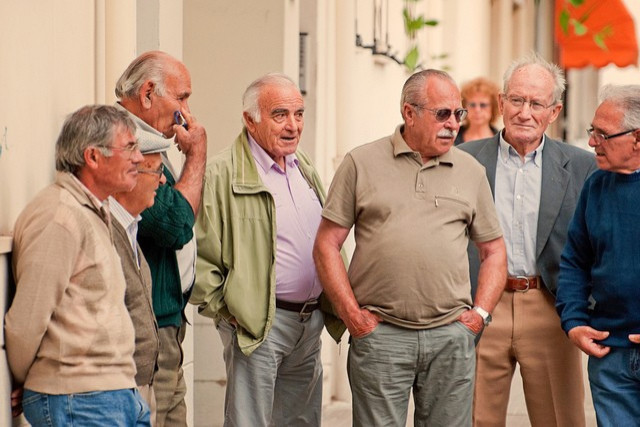Sardinia's Secret To Longevity: Genetics, Diet and Lifestyle
ANALYSIS

In the Mediterranean Sea, there is an island paradise rumored to have a different kind of "air" that grant longevity into the people who live there - Sardinia, an autonomous region of Italy, where scientists have been trying for years to discover the secrets of why these men and women live such long lives.
With a population of 1.6 million, Sardinia has confirmed to have the world's highest documented percentage of people who have passed the century threshold, according to the Guardian newspaper of the UK.
While scientists still can't determine whether the secret behind Sardinians' long lives is diet, lifestyle, genetics or the combination of thereof, the island's Melis family was recognized by the Guinness World Records on Tuesday for having the world's oldest combined age in a family.
Nine elderly siblings of the family are now (in the aggregate) 818 years old, with the oldest, Consolata, reaching 105 on Wednesday and the youngest sibling, Mafalda -- affectionately nicknamed by her older brothers and sisters as "The Little One" -- at the relatively spry age of 78.
The siblings live in a close-knit family which comprises 150 children, grandchildren and great-grand-children.
"Genes and lifestyle are paramount, but luck plays a big part - avoiding accidents and falls, and so on -- so to have such a large number of living siblings with an average age of more than 90 years is incredibly rare." said the Guinness World Records editor- in-chief, Craig Glenday.
To Alfonso Melis, one of the celebrated siblings, however, the secret to long life is not exactly that complicated. When asked the question, he simply said: "We eat genuine food, meaning lots of minestrone and little meat and we are always working."
At the age of 89, he can be found either working at a café he runs or working in his own garden, growing beans, aubergines, peppers and potatoes.
His older sister, Claudia, who still attends church every morning at the age of 99, gave an almost identical response: "You just keep working and you eat minestrone, beans and potatoes."
Living in a village of Perdasdefogu in a mountainous region of Sardinia, the Melis family's health came as pleasant news to the Sardinian people, though it is not at all a surprise.
At least 371 of Sardinia's current population have reached the 100 years mark -- the corresponding ratio is astonishingly 20 times greater than that found in the United States.
The secret to Sardinians' long life is the subject of study of a project called AKeA - an acronym for "A kent' annos," a traditional toast in the Sardinian culture that means "May you live to be 100 years."
The leading researcher, Luca Deiana from the University of Sassari in northwest Sardinia, found that genetics play a key role, observing that it is generally in the central-eastern mountainous region that longevity is most common.
The ruggedness of the geography has repelled invaders for centuries, and there has been little intermarriage with outsiders since then, thereby preserving some of the beneficial genetic traits.
For example, Deiana, along with his team of 25 Italian doctors and biologists, identified a gene in the Y chromosome that can greatly reduce heart attack and stroke in men.
This gene, passed down from fathers to sons, can explain the ratio of male-female centenarians in the region, which is about 1-1, while the ratio is generally 1-4 all around the world.
Diet is also considered to be crucial -- as the Sardinian diet is rich in healthy nutrients from fresh locally grown vegetables, prepared simply with olive oil and served with lemon, garlic and other spices.
Sardinians' diet is particularly rich in proteins derived from milk and cheese, while low on sugary food and meat. Many of them eat meat only once or twice a week. The dishes are usually a small piece of lamb, lean pork, oily fish or shellfish accompanied by a lot of vegetables.
A glass of wine is considered indispensable in Sardinian culture, along with a chunk of sheep's cheese or goat's ricotta.
The amiable climate of the Mediterranean also helps in keeping these old men and women in a good mood. A villager from the town of Orroli believes that it is truly something "in the air" that keeps the people alive for so long, as reported by TIME magazine.
Last but not least, beyond the genetics, food, weather and lifestyle, Deiana also believes that the Sardinian culture is also a factor of the people's longevity.
In Sardinia, elders are continued to be held in high regard and included in family life, and most of them are encouraged by the village to be actively involved as an important social presence.
Mario Antonio Attene, the mayor of Silanus, a town of 2,400 with around ten centenarians, made a statement in an online interview saying that the lives of Sardinian old men and women "have great meaning because they do not get locked in a retirement home. They are happy to be alive and convinced it's worth it even though they may be old and ill because they have the affection of children, loved ones and grandchildren."
However, not even Sardinia is immune to the worrying trends of the modern world, including the omnipresent force of globalization.
As long ago as 2005, National Geographic magazine reported that the presence motor vehicles on the island has greatly reduced the healthy exercise of walking. Obesity, which was unknown in Sardinia prior to 1940, now affects about one-tenth of the population.
"Children want potato chips and pizzas. That's what they see on TV," said a local named Tonino. "Bread and pecorino [a hard Italian cheese] are old-fashioned."
© Copyright IBTimes 2024. All rights reserved.





















